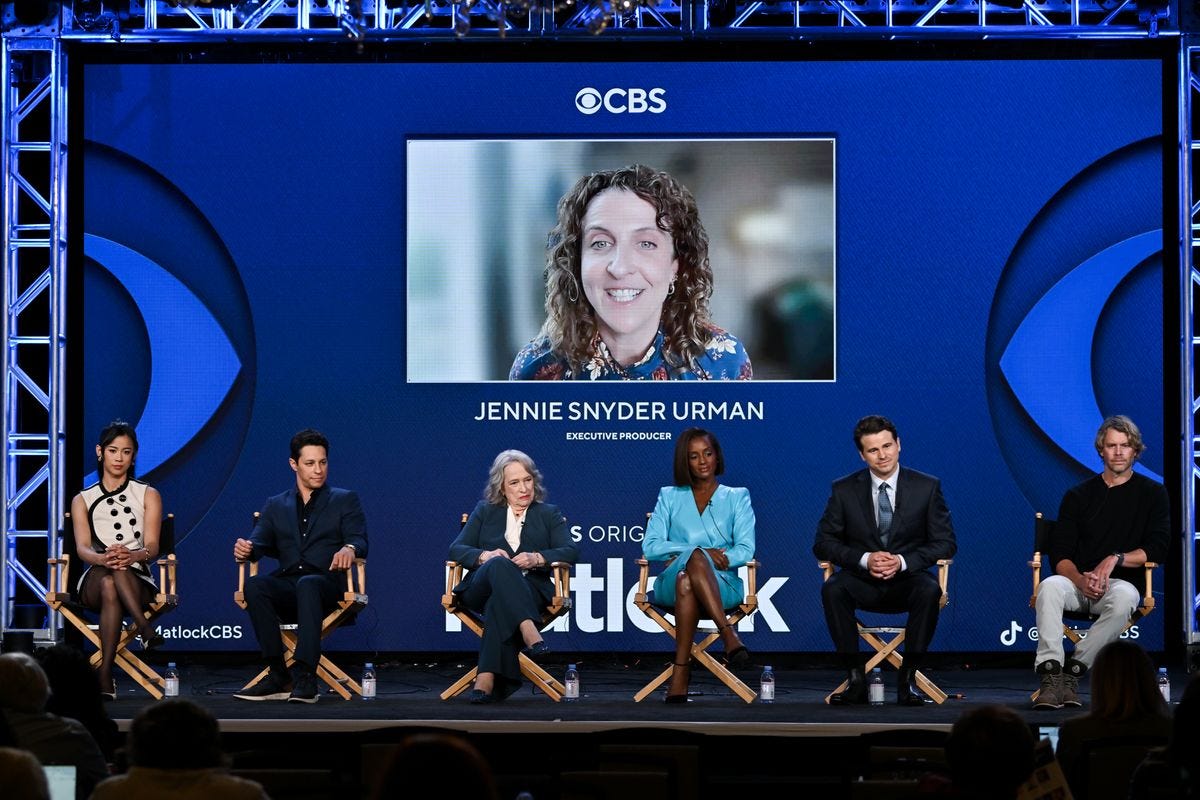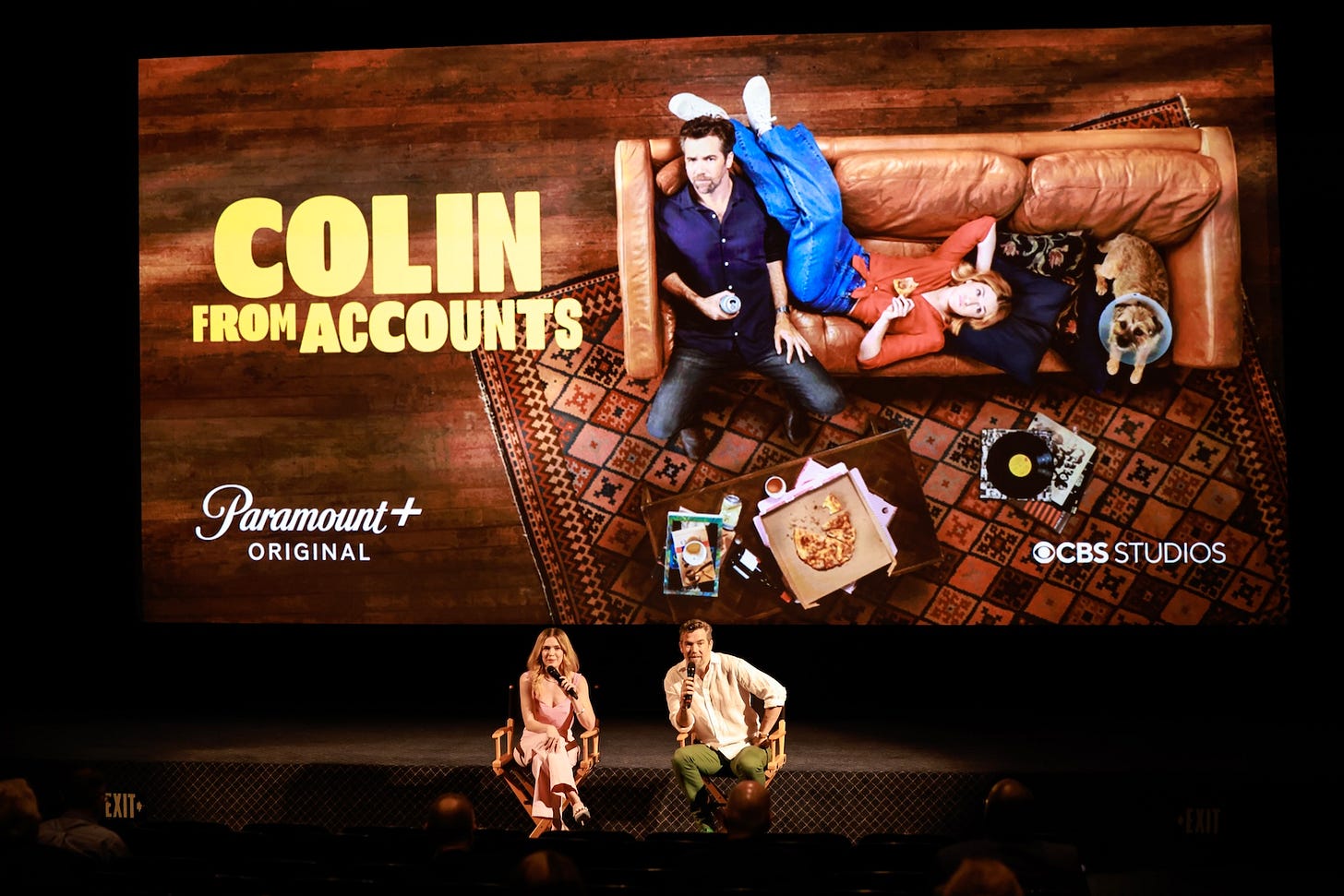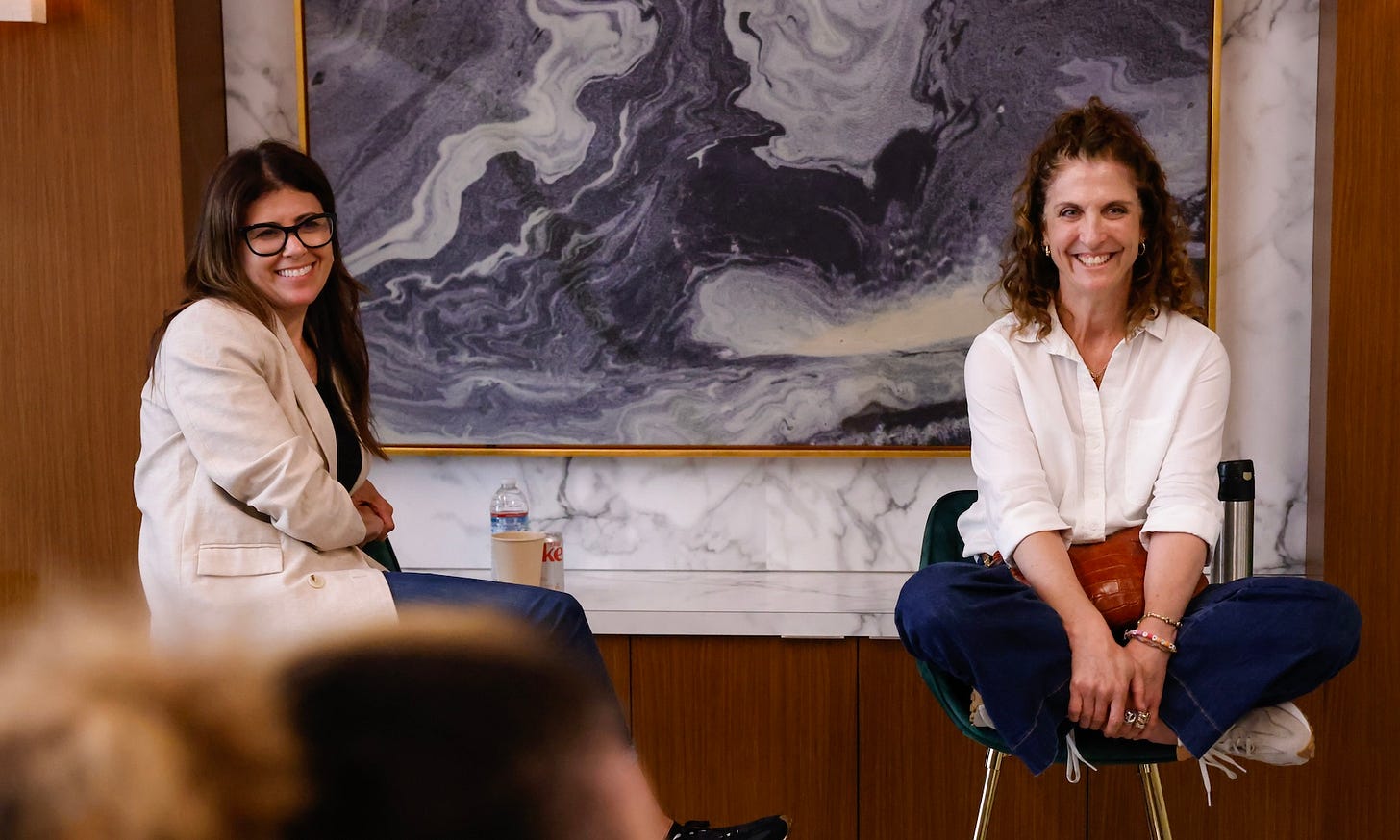Week-to-Week: Yes, the Buzziest Show of Summer Press Tour was Matlock
We were just as surprised as you are (which is where the buzz came from, really)
Welcome to Week-to-Week, the (mostly) weekly newsletter of Episodic Medium written my its editor-in-chief, me, Myles McNutt. To receive future newsletters and updates on the shows we’re covering weekly for paid subscribers, sign up for free today. If you’d like to support our mission and get all those great reviews, yearly subscriptions are 20% off through 9/30. You can read more here.
And if you want to hear more about Matlock, see below for a live chat in the Substack app happening this afternoon (9/23).
The Television Critics Association Press Tour might sound glamorous, and it’s certainly a privilege to get to spend your days asking questions of the people who make television, but here’s a secret: while you might be imagining late nights in a hotel bar socializing with the stars, in the evenings it’s usually just a lot of lying in your fancy hotel room watching screeners on your laptop.
You don’t have to watch screeners to participate in a press tour session, and there’s usually at least a question or two every panel which makes it clear that some people didn’t get to the episodes provided. There’s a few reasons this could be: networks are sometimes late sending them out, or don’t send them out to every member, or forget to send them out at all. Other times, though, it’s simply a matter of there being too many shows to watch and not enough time to watch them, not to mention the other work any journalists might be doing while covering the event.
I offer this preamble because my favorite thing about Press Tour is when doing my “homework” takes on a sense of discovery. There’s an energy to a situation where you’re with 100+ of your colleagues, and you know you all sampled the same screeners in preparation for the same panels, and there’s this subtle buzz that works its way through the group. It’s a reminder of the intangible part of press tour that you can’t exactly quantify or manufacture, where there’s just a “vibe” around a particular show that becomes a story unto itself.
An example of this is Colin From Accounts, which returns for its second season on Paramount+ with all eight episodes streaming on Friday. This was a co-production that launched in Australia back in 2022, but made its way to the U.S. last fall, and it arrived to…fanfare is not the right word. I saw a handful of people on my feeds talking about it, but its first season had only a handful of critical reviews, and it felt like an example of the kind of show that slipped past the radar of most of the TCA’s members. That included me, of course, right up until Paramount added a screening of the season two premiere to the company’s “Set Visit” day at the end of summer tour.
While I am diligent with my homework—the perils of staying a student for…a very long time—I did not have time for an entire season of TV amid all of the other screeners, but I watched the show’s pilot on the treadmill the morning of the session, so I at least had some idea what the series was about. It’s not exactly complicated, really: Colin is the dog Gordon (Patrick Brammall) ran over while being flashed by Ashley (Harriet Dyer), who survived and now serves as a tether between two people who come together to take care of him and each other. The rest is a hangout comedy, really, but with a compelling emotional honesty that pairs well with witty wordplay, and a sense of real stakes for everyone involved (yes, including Colin). The pilot was fun, and I was interested in watching more, but circumstances meant I had to fastforward to the season two premiere, which was followed by a Q&A with Brammall and Dyer (the husband-wife team who also co-created and write the series).
What struck me about that screening of a very solid premiere—I’ve since gone back and watched all of season one, and the first half or so of season two—is that the best thing to do when you have a good show in the era of Peak TV is to lock critics in a room and show it to them. I talked to a lot of journalists in the room who had never seen the show but laughed a lot, and who were planning on checking it out. I’m not sure if this is going to dramatically increase coverage for Paramount+, but Brammall and Dyer were super charming and gracious in the episode’s first screening for an American audience, and it was a great example where you could just feel a show going from “oh, there’s this co-production thing” to “funny Australian show returns” within the span of a couple of hours.
Ultimately, though, the same trip to the Paramount lot highlighted the show that felt the most transformed by the Press Tour experience this time around. At February’s winter tour, that was no doubt Shogun, as FX took a pre-victory lap for the period drama that went on to sweep through this year’s Emmy Awards. This time, though, the talk of the tour was not a show that’s likely to sweep through the Emmys, or even end up in most critics’ Top 10 lists—it was instead an unassuming legal drama that on paper represents everything wrong with creativity in Hollywood.
I knew CBS was making a Matlock reboot starring Kathy Bates, mainly because it was ordered to series for last season and then pushed due to the strikes. But I had honestly never looked at any additional information about the series—I may be writing about TV in a more professional capacity than ever, but my capacity for keeping up with the minutiae of pilot orders is more or less gone (and CBS didn’t send me PR emails until I became a TCA member). As a result, by the time I sat down to do my homework with the two episodes of Matlock that CBS made available to TCA members ahead of the network’s panels, I had zero additional information regarding the series outside of its star and its premise…or, what I thought was its premise.
NOTE: I am going to spoil the premise of Matlock, which I know seems like an insane sentence but it is a show built on a central twist. Accordingly, if you’re intrigued enough by the idea of this that you want to experience it for yourself, get thee to Paramount+ and then come back. If you just want to know why in the world there’s a spoiler alert for Matlock, you can read ahead.
The first moment of transformation came a few minutes in, when a chyron popped onscreen identifying Jennie Snyder Urman as the show’s creator/developer. I don’t exactly know how I missed this news, as someone who was a big fan of Jane the Virgin and enjoyed occasionally chatting with Jennie on Twitter while it was on the air, but it had snuck by me. It also surprised me, since I went into Matlock pretty cynical about the creative impulses behind the project. Why not just make a new legal drama instead of a reboot? Why does this have to be tied to a previous lineage?
Close by to that chyron, the pilot reveals what seems like its “twist”: it isn’t a reboot of Matlock at all, but rather a series which uses the cultural legacy of Matlock as a frame of reference for a show about a different kind of senior lawyer. Bates’ Madeline Matlock—or Matty—just happens to share a name with someone people recognize, which she uses to her advantage in charming a prestigious law firm to give her a chance to return to the workforce after her dirtbag, dead husband left her with nothing. The idea is that Matty is old in ways that make her invisible, which helps her get information she shouldn’t have, and sneak into the law firm in the first place. It’s a clever-enough bit of modernization that steers away from the original but would let the show naturally settled into fish-out-of-water stories and conflicts with both her bosses (once-married lawyers Olympia and Julian) as she fights to remain at the firm.
But as viewers who tuned into the special preview of the show last night found out—it returns next month—this isn’t the twist at all. The actual twist, which we can finally talk about now that it’s aired, is that Madeline’s last name isn’t a coincidence: it is an alias, chosen for its folksy charm. As we learn when she gets off her bus to a chauffeured car, Madeline Matlock is actually Madeline Kingston, a wealthy woman whose husband is very much alive (and played by Sam Anderson, Lost’s Bernard) and helping her infiltrate the law firm she believes is responsible for burying evidence of the opioid crisis that claimed her daughter’s life. Working alongside her tech savvy grandson, Matty is living a double life in the hopes that she gets close enough to the three attorneys—Olympia, Julian, and Julian’s father Senior—to learn which one hid the files.
I don’t want to overstate the effect of this twist. This is still an incredibly episodic, by-the-numbers legal procedural which focuses on Matty working with Olympia’s two junior associates—Sarah and Billy—to win cases. The cases are distinct in that they all have a general focus on social justice, but they’re still the type of legal cases you’d expect in a show aiming to produce 22 episodes a season. And while those cases are elevated with the presence of an actress of Bates’ caliber, and she is well matched by Skye P. Marshall’s Olympia, there’s a fundamental limit to what you can do in that format. Some shades of characterization emerge in Olympia’s co-parenting relationship with Julian (Jason Ritter) intersecting with her work as their divorce is finalized, but for the most part this is the kind of slow accumulation of story that you’d expect in a character-driven procedural.
But having a high-stakes plot operate beneath that procedural structure gives Matlock an energy that is so often absent from the genre. In his review at The Hollywood Reporter, friend of the newsletter Daniel Fienberg rightfully notes that this energy has a shelf life—like him, by the end of the six episodes CBS sent to critics, I did start to find that the novelty had worn off a bit. However, it doesn’t change that the truth about Matty’s life gives Bates the kind of emotionally complex material you don’t get in a straight procedural, and the way the cases are designed to trigger those responses adds weight to both sides of the narrative structure. I don’t know if I was exactly on the edge of my seat regarding the seasonal arc after six episodes, but the very fact that I’m thinking about Matlock at all is a shock given the cynicism it inspired in the abstract.

And it’s amazing what that can do to energize a press tour cycle. We saw Matlock and its cast twice—first on a panel, and then again on a set visit. The former was critics’ first chance to hear about the show and honestly mostly listen to Kathy Bates tell stories about her acting career (and throwing some polite shade at her last network TV gig on Harry’s Law), but the latter gave us more time to chat with Urman and the cast, along with a chance to chat with the production designer about the design of the law firm and moving the sets from Toronto where the pilot was filmed. It was extra time to see the cast and crew talk about the positivity of their experience, and to go beyond that veneer of cynicism that defined the show for most of us before we saw it.
When we got to Urman’s “station” in the set visit—we rotated between her, Marshall, and Ritter in addition to the Production Design room—it gave me a chance to ask her what I didn’t ask during the panel a few days earlier: why Matlock? Her answer was such a good reminder of how being a working writer functions: the idea of developing a Matlock reboot was one she put forward as an idea for her production company Sutton Street Productions, which was an overall deal with CBS. I’m reading between the lines here, but given the overall deal, one of the best ways of getting a show made is to work with I.P. that the network already owns, and so she put forward Matlock as an idea that she actually intended to hand off to another writer. However, when she approached CBS she learned they already had a Matlock rights agreement in place with NCIS: LA star Eric Christian Olsen and his fledgling production company, and so CBS proposed a compromise: Eric stays on as a producer, but Jennie takes the creative reins herself.
The result is the fall show that I’m most interested in seeing play out, even though I’ve now seen most of the episodes that will air this fall. I don’t think Matlock is going to revolutionize television, and if you’re deeply allergic to procedurals you’re not going to suddenly fall in love with them here. However, the surprising amount of complexity created by Urman in this case character and her circumstances just has an energy to it that was evident during the press tour sessions. And while as a writer-centric critic I was particularly compelled by hearing Urman talk about her creative process, promising resolution to the mystery in the first season and understanding the delicate balancing act the serial/procedural elements present, the cast were equally as eloquent and enthusiastic about their experience. Their answers to questions about the show were engaged and thoughtful, but they were also very comfortable with us during our time on set: Marshall joined us in playfully questioning the prop department’s choice of generic office decoration, while Ritter told us to keep an eye on the below object on Julian’s desk—he puts it into a new configuration in each episode. I also had a nice chat with David Del Rio, who didn’t get questions directed to him during the panel but was clearly happy to be there as a representative for an experience he really values.
But in many ways it does come down to Kathy Bates, doesn’t it? And on both the panel and a brief pre-set tour additional Q&A, Bates spoke highly of Urman and the experience, clearly relishing what this role offers her. For your average viewer, Kathy Bates and Matlock are probably enough of a draw to get at least a sampling, but what became clear during press tour was that this was a show that was hoping to leverage the I.P.-driven realities of the industry in the interest of making something that transcends it. I don’t know if its aspirations are truly that lofty, but it’s off to a solid start, and I’m hopeful that the enthusiasm that came out of its press tour leads at least some people to find a new favorite where they wouldn’t have expected one.
Episodic Observations
Okay, so Urman told friend of the newsletter Marisa Roffman that there is no additional twist insofar as the central mystery: one of the three lawyers will be revealed as the one who hid the documents. There has been more progress on the investigation where I’m at, so I won’t spoil anything, but my “solving” has mainly been a question of which result would be the most dramatically interesting. For this reason, I’ve decided my prediction is going to be Olympia, because her relationship with Matty will be the most strongly developed, and therefore it will require the most reconciliation. (It would also help explain why she decided to switch to pro bono-style class action suits).
Because of the strikes and getting pushed back to fall, they’ve shot almost the entire season of Matlock at this point, and I’ll be curious how character balance plays out: so far, Jason Ritter’s Julian has been pretty underutilized, but that seems to be shifting around episode six, and therefore I’m wondering if the focus will keep evolving as it moves forward.
I don’t know if I’d say that the directing on Matlock is particularly distinctive, but its directing EP is Kat Coiro, who came to the show from a very different legal show in She-Hulk: Attorney at Law. And yes, we asked her about the lack of CGI on this project.
I hadn’t seen enough of Evil during press tour to realize that Patrick Brammall was perhaps best known to American audiences from there, and I also never saw American Auto to catch Harriet Dyer’s biggest U.S. role. The fact they made this in the midst of all that, and that Dyer also had a baby? An impressive run.
I wondered as the Colin from Accounts screening was happening if they were watching with us, and as they bounded down to the stage for the Q&A, I knew they had: they noted that obviously one of their jokes was based on a culturally-specific Australian reference given that we didn’t laugh, but then confirmed it was also a thing in America, and determined that we just didn’t find it funny. For the record, I was saying boo-urns.
A fun fact from the Matlock set visit: Marshall worked with Urman on Emily Owens M.D., which also shot in Toronto, and in a cosmic coincidence the law firm set was actually repurposed from that show. Marshall helped us map out how her office and waiting area used to be patient rooms.
Episodic Programming Note
Speaking of friend of the newsletter Marisa Roffman, the Editor-in-Chief of Give Me My Remote will be joining me this afternoon at 5pm ET for a special Matlock Monday live chat on Substack. If you’re a user of the app (which you can download here), you’ll get a notification. They want me to also have me send you an email if you’re not a user of the app, but I’m going to forego that option because it will become obnoxious if I keep going live on a regular-enough basis. An archived version of the chat will be available later this week.






The idea of a Matlock reboot was one I had entirely dismissed (while likewise missing it was from the creator of Jane the Virgin, which I loved). So thanks for this! It sounds like it might hit that The Good Wife sweet spot of balancing the procedural stories with an interesting larger plot, so I'll definitely have to check it out now.
Okay I watched the Matlock episode. Wow. That ending! I am a fan of procedurals but am hoping subsequent cases are a tad better. To be fair they were establishing what the show was at the same time. As someone above mentioned this show pairs nicely with Elsbeth. It does feel like the culture at CBS is finally moving beyond Les Moonves. It reminds me of older eras like Murder She Wrote and Cagney and Lace.